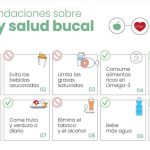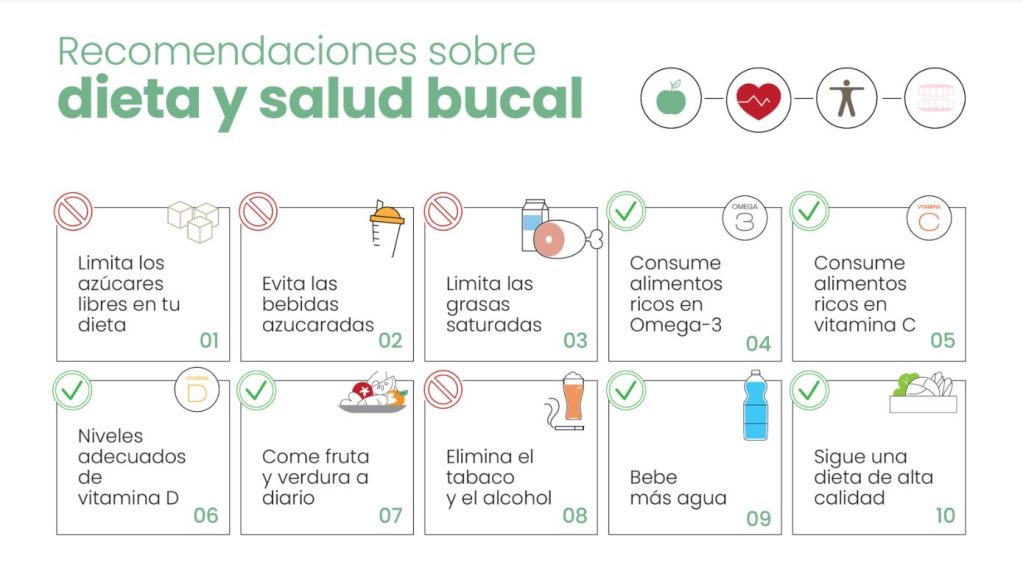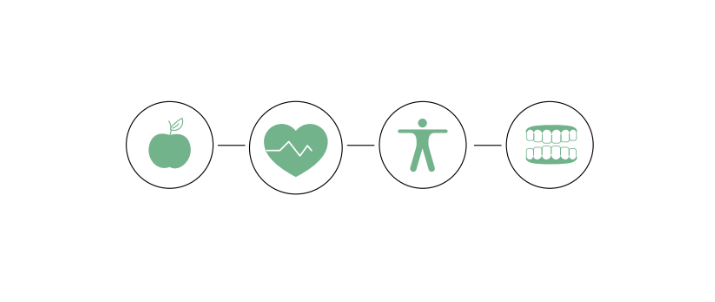

Through the decalogue of recommendations led by Sepa, it is intended raise awareness of bad habits and the close relationship between a good diet and oral health in order to improve the health of the population and prevent diseases such as periodontitis.
This compilation of recommendations, presented at the Congress of Periodontics and Oral Health (Sepa Bilbao’24), has been reviewed by the ‘Diabetes and Periodontitis’ Working Group of the Spanish Diabetes Society and the Spanish Society of Periodontics.
A multidisciplinary team of experts that includes periodontists, endocrinologists and obesity specialists has also participated in its writing.
Objective of the decalogue on diet and oral health
“With this document we take another step in the permanent commitment of the oral health team to the promotion of the oral and general health of the population,” indicates Dr. José Nart, president of the Spanish Society of Periodontics and SEPA Foundation.
“The dental health team should include basic dietary advice to all patients, recommending increasing the intake of fish oils, fiber, fruits and vegetables and reducing levels of refined sugars. This benefits general health and periodontal health,” emphasizes the doctor.
An unbalanced diet negatively influences both oral diseases and general health. To prevent and adequately address these complications, the professionals who have participated in the decalogue advise adopting a series of basic measures regarding nutrition, summarized in 10 guidelines.
According to the Decalogue, there is growing evidence that points to the obesity and associated inflammation as a risk factor for periodontal disease.
For this reason, Dr. María del Mar Malagón, president of the Spanish Obesity Society, emphasizes that professionals must know the complexities of obesity and convey to patients the importance of maintaining a healthy weight and good dental hygiene.


Periodontitis: a risk factor
The periodontitis, like other chronic diseases such as obesity, diabetes, cancer or cardiovascular diseases, is conditioned by a series of risk factors and indicators. One of these indicators is the feedingwhose benefits and harms contribute to activating or reducing the inflammation.
According to the decalogue, the excess of pro-inflammatory products in the dietsuch as refined sugars or saturated fats, is related to local and systemic inflammation.
However, A diet low in these substances and rich in foods with omega-3 fatty acids, vitamin C and D and micronutrients derived from fruits and vegetables, contributes to reducing inflammation.
Furthermore, it has been observed in numerous studies (cited by the Decalogue) that people with obesity have a greater predisposition to suffer inflammation of the gums, which, if not treated properly, can trigger periodontitis.
“It is estimated that a person with obesity has approximately 3 times the risk of suffering from periodontitis, and this is independent of age, race or tobacco consumption; Furthermore, the higher the Body Mass Index (BMI), the risk of periodontitis increases linearly and that it is more serious and progresses more quickly,” says Dr. Cristina Serrano, periodontist and coordinator of the Report.
“It is easier for a person with normal weight to have healthy gums than a person with obesity, and therefore, people with obesity (whether it is their CGMI or their waist circumference that is elevated, or both) ) they should take care of and check their gums much more,” adds the doctor.
Recommendations on diet and oral health
The best diet is the one that has the most colors, which is why the decalogue recommends a rich, varied and balanced diet that includes nutritious foods. In addition, he advises other habits such as eliminating tobacco and alcohol or drinking more water.


1. Limit free sugars
Limit them to 5-10% of total energy intake as recommended by the WHO. Free sugars are most present in honey, syrups, juices and fruit concentrates. Refined carbohydrates are foods inflammation inducers in the body and in the mouth they are associated with both cavities and gingival inflammation.
The complex carbohydrates from fruits, vegetables and nuts have been shown to be healthy.
2. Avoid sugary drinks
These include carbonated and non-carbonated soft drinks, fruit or vegetable juices, liquid and powder concentrates, flavored water, energy and sports drinks, ready-to-drink tea and coffee, or flavored milks. All of these foods are a significant source of added sugars that displace other nutritious foods and increase the risk of cavities and periodontal diseases for him acidic pH that damages tooth enamel.
For this reason, it is preferable to consume whole fruits instead of the juices extracted from them and in the case of coffee and tea, the least processed ones are recommended.
3. Limit saturated fats
Trans fats from ultra-processed products (such as industrial pastries), and saturated fats from red meat, whole milk, cheese, butter or ice cream have the ability to induce inflammation if eaten in excess.
Unlike trans fats, Healthy fats are essential macronutrients for our health both for energy production and for correct absorption of fat-soluble vitamins and essential fatty acids. A diet rich in this type of fat increases oxidative stress, which can alter our immune response to bacteria.
These types of fats are found in foods rich in omega-3.
4. Increase Omega-3 consumption
The decalogue recommends the consumption of foods rich in omega-3 mono- and polyunsaturated fats, since Omega-3 is a essential fatty acid that our body does not produce and therefore we must ingest with diet. It is a powerful anti-inflammatory and it has an effect protective on periodontal tissues.
According to a study cited by the Decalogue, it may be that people who eat more omega-3s are less predisposed to suffering from periodontal diseases.
We can find these fatty acids, above all, in oily fish (salmon, sardines, mackerel, tuna, bonito, etc.), nuts, avocados and extra virgin olive oil.
5. Eat foods rich in Vitamin C
10% of people have a deficit of vitamin C, a percentage that amounts to 30% in the case of the smokers according to another study cited by the decalogue. Vitamin C is essential in the formation of collagen and the immune response against bacteria and its deficiency can lead to periodontitis.
Vitamin C results appear to be better if it is ingested from fruits and vegetables than through supplements.
6. Maintain adequate levels of Vitamin D
Minerals like magnesiumhe calcium and the match They are structural components of the teeth and the bone that supports them. They must be properly absorbed to avoid problems in the teeth, such as cavities, and also in the gums, such as periodontitis.
Vitamin D is necessary for the absorption of these mineralsbut it is also a powerful regulator of the immune responseso it is of great importance to avoid both cavities and periodontitis.
Apart from the intake of dairy products, calcium can also be found in other foods such as oily fish, almonds, hazelnuts, crustaceans and chickpeas, which are also rich in magnesium.
7. Eat fruit and vegetables daily
Fresh fruits and vegetables are rich in micronutrients in addition to being a source of antioxidants. Each ingredient has a different function in the metabolic and physiological processes of our body, in addition to complementing each other. That is why a rich and varied diet is recommended.
- The antioxidants neutralize inflammation and infections thanks to the fact that they avoid oxidative stress.
- The anti-inflammatory and anti-infective would be vitamin B and fatty acids such as omega-3.
In the case of fruit, it is recommended to eat it whole to maintain the fiber that improves its absorption. Regarding fruit with a more acidic pH, such as kiwis and citrus fruits, it is recommended to delay brushing your teeth for an hour to avoid accentuating their sensitivity.
8. Eliminate tobacco and alcohol
The abuse of these substances causes micronutrient losswhich leads to a increase of susceptibility to inflammation and to oxidative stress. They also increase the risk of oral cancer, but the combined consumption of both multiplies the risk of suffering from cancer by five, in relation to those who only smoke or drink alcohol according to the decalogue.
It is strongly recommended to stop using these substances.
- Smokers have a higher risk of suffering cavities as well as contracting diseases periodontal and peri-implantin addition to responding worse to the treatment of both pathologies.
- Alcohol, being a diuretic, causes dehydration or dry mouthwhich has a harmful influence on a multitude of oral problems.
9. Drink more water
Water helps in nutrient absorption and in the waste disposal. It keeps us hydrated, which is essential to prevent dry mouth syndrome, which increases the risk of mucosal alterations, cavities and gum inflammation.
Also a report cited by the decalogue indicates that increasing water intake in men over 45 years of age considerably reduces the risk of suffering from periodontitis.
10. Eat a high-quality diet
An example is diet Mediterraneancharacterized by the consumption of extra virgin olive oil, fruits and vegetables, nuts and oily fish, accompanied by a moderate consumption of meat and dairy products.
Another option is diet Atlanticwhich prioritizes foods such as potatoes, whole wheat bread, whole grains, nuts, legumes, honey, fish, crustaceans and dairy products.
Both diets are associated with health benefits whose results improve when combined with physical exercise and maintaining weight at appropriate levels.

